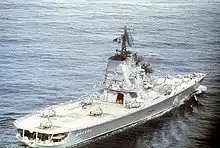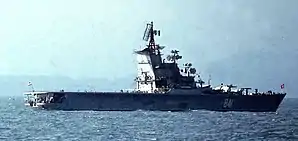Soviet helicopter carrier Moskva
Moskva was the first of her class of helicopter carriers in service with the Soviet Navy. Laid down at Nikolayev South (Shipyard No.444), Moskva was launched in 1965 and she was commissioned two years later. Moskva was followed by Leningrad, which was commissioned in late 1968; there were no further vessels built, reportedly due to the poor handling of the ships in rough seas. Both were conventionally powered.

 Moskva off the coast of Morocco in January, 1970 | |
| History | |
|---|---|
| Name: | Moskva |
| Namesake: | Moskva |
| Builder: | Ukraine Nikolayev South Shipyard |
| Launched: | January 14, 1965 [1] |
| Commissioned: | December 25, 1967 [1] |
| Decommissioned: | 1996 [1] |
| Fate: | Scrapped |
| General characteristics | |
| Class and type: | Moskva-class helicopter carrier |
| Displacement: | |
| Length: | 189.0 m (620.1 ft) [1] |
| Beam: | 34.0 m (111.5 ft)[1] |
| Draught: | 7.7 m (25.3 ft)[1] |
| Propulsion: | geared steam turbines, two shaft, 4 pressure-fired boilers; 100,000 shp (75,000 kW) |
| Speed: | 31 knots (57 km/h) |
| Range: | 14,000 nautical miles (26,000 km) at 12 knots (22 km/h) |
| Complement: | 850 |
| Armament: |
|
| Aircraft carried: | 14 Ka-25 'Hormone' helicopters |
The Moskvas were not true "aircraft carriers" in that they did not carry any fixed-wing aircraft; the air wing was composed entirely of helicopters. They were designed primarily as anti-submarine warfare (ASW) vessels, and her weapons and sensor suite was optimized against the nuclear submarine threat. Shipboard ASW armament included a twin SUW-N-1 launcher capable of delivering a FRAS-1 projectile carrying a 450 mm torpedo (or a 5 kiloton nuclear warhead); a pair of RBU-6000 ASW mortars; and a set of torpedo tubes. For self-defense, the Moskvas had two twin SA-N-3 SAM launchers with reloads for a total of 48 surface-to-air missiles, along with two twin 57 mm/80 guns. A "Mare Tail" variable depth sonar worked in conjunction with heliborne sensors to hunt submarines.
Their strategic role was to defend the Soviet ballistic missile submarine bastions against incursions by Western attack submarines, forming the flagships of an ASW task force.
Leningrad was taken out of service in 1991, but Moskva remained in service until the late 1990s, when she, too, was scrapped.
See also
Notes and references
- "Project 1123". Archived from the original on April 4, 2013. Retrieved January 29, 2013.
References
- Project 1123 Kondor - Moskva class, russian-ships.info
- (in Russian) Moskva class
